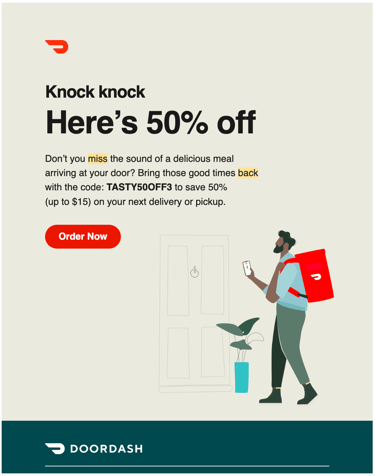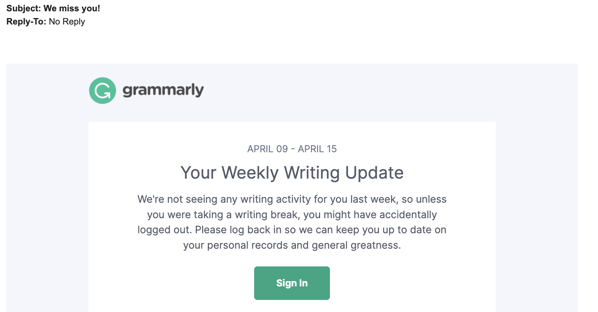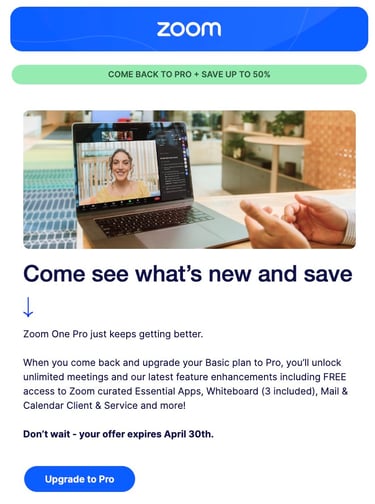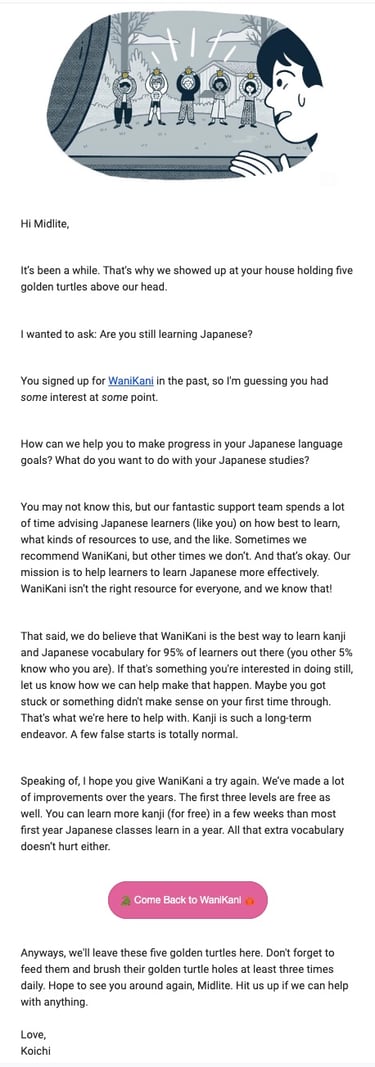Nobody’s perfect — that’s true of people and businesses.
While your company is bound to make mistakes, focusing on your strategy for getting those users back is essential. A “we miss your business” letter could help you regain customers.
Below, you’ll learn tips for reaching out to ex-customers. Then, we’ll explore example letters you can send to get them back.
Table of Contents

Typically, clients leave for one of two reasons: They find a better price with a competitor, or your company makes a mistake that upsets them.
While more nuanced reasons are at play, these are the two most common scenarios. To prepare, consider writing two “we want your business back” letters based on the circumstances.
However, before you send a “we want your business back” letter, you should understand why your customer left. To do this, consider sending exit surveys whenever you lose a customer so you know why they decided to go.
Then, it’s time to start drafting the right message. Here are a few best practices to remember when writing your letter.
Featured Resource:
Pro tip: Need a better way to communicate with your customers? Reach out using our , including apology emails and “we want you back” email templates.
Want to learn how to re-engage customers? Check out these .
We Want Your Business Back Letter Tips
1. Personalize the message.
When sending a letter to get someone’s business back, you should focus on them. Use “you” instead of “I” language to show you’re more concerned with their needs and goals than your own.
Plus, your letter should address your client’s specific reasons for leaving. Was it because of a mistake you made? A competitor? Whatever the situation is, address it in the letter.
2. Include some formalities.
Although informal language can sometimes work, make sure to keep a higher level of formality. You should exude professionalism, which will make someone comfortable with getting into business with you again.
A lack of formality could cause customers to lose confidence in your company or, worse, suspect that your apologies are insincere. The last thing you want is customers telling their friends how you messed up and didn’t care enough to fix it.
Pro tip: If you’re incentivizing customers with a discount or special offer, you can use a more informal tone. If you’re apologizing for a mistake that led to lost business, keep your message formal.
3. Add an offer.
If your customers have left to use a competitor’s product, adding an offer can help entice them to come back to you.
You could include a discount or address their pricing concerns in another way. Adding an offer also helps if your customer didn’t leave for a competitor.

4. Take responsibility.
If your company makes a mistake, you must take responsibility for it. You should issue an apology that genuinely shows your company’s remorse.
Customers understand you can’t be perfect, so they’re more likely to forgive if you’re remorseful and take appropriate actions.
Just look at Johnson & Johnson. After the 1982 disaster, in which a murderer laced Tylenol capsules with potassium cyanide and killed several people, the company swung into action.
Johnson & Johnson warned hospitals and distributors of the poisonings and halted production and advertising of Tylenol. Then it issued a nationwide recall of Tylenol products, amounting to 31 million bottles worth $100 million.
The company advertised to individuals not to consume its acetaminophen products. It also offered to exchange all Tylenol capsules for solid tablets.
The actions of Johnson & Johnson showed that the company was more concerned with public health than its bottom line. The brand earned wide praise after the incident.
5. Incorporate a call-to-action (CTA).
Your letter should include a clear way to contact you, like in the example below.

If people don’t know how to get back in business with you, they won’t. That’s because when customers need clarification, they’ll be cautious about purchasing.
So, use straightforward language that lets the customer know what to do next.
6. Be human and genuine.
Your letter should be human, helpful, and genuine. If you’re emailing, consider stripping the formatting to look like a friend or colleague wrote it.
Also, send your email to a human who can reply. When people get mass “no-reply” emails, they tend not to respond.
These tips will help you to think about what you want to say in your “we want your business back” letter.
But if you still have writer’s block, below are examples to help get you started.
We Want Your Business Back Letter Templates
A letter asking for a client’s business could reignite your relationship with a past client or help you maintain it.
With just a few minutes of your time, you could save on the cost of acquiring a new client by winning back one that almost walked away.
Here are three “miss you” letter templates you can use to win back customers.
Template 1: Apologizing for a Mistake
Dear {Name},
We are so sorry for {insert mistake}.
We always aim to offer our clients the best customer service, and we know we let you down. To resolve this issue, we’re going to {insert solution}.
We want to express how deeply sorry we are for the stress and frustration this must have caused you. To make it up to you, we’d like to offer you 15% off your next order with us. We hope you’ll still consider using our products in the future.
If there’s anything else we can do to help, just hit “reply” and let us know!
Sincerely,
{Name}
Template 2: Checking in on an MIA Client
Dear {Name},
We love having you as part of our family!
But we noticed you haven’t purchased with us in a while. Was it something we said?
Your connection with our business means everything to us. We want to provide you with the products and services you need. We’re always making improvements to serve our customers better.
If it’s just been a while since you shopped with us, great! But if there’s another reason you haven’t been around, we’re here to listen. Just submit your idea, request, or something we need to hear in the “reply” button below.
We hope to see (and hear from) you soon.
Sincerely,
{Name}
Template 3: Contacting a Customer Who’s Left
Dear {Name},
We hate to see you go.
For the past {X} years, we’ve valued your relationship with us. We always look forward to serving you.
We’ve noticed you haven’t made a purchase in {time}. The last thing we want to do is lose a customer like you.
We’d love to hear from you if there’s anything we can do to improve your experience! Let us know through the “reply” button below.
Your relationship means so much to us. Let us know if we need to change anything to keep it!
Sincerely,
{Name}
“We Miss Your Business” Letter Examples
Now that you’ve learned best practices and gathered templates, let’s check out real-world emails intended to get business back.
1.

It’s been a while since I logged into Grammarly, and their email is a gentle reminder that it’s time to return.
This email asks if I’ve been taking a break or if I logged out on accident, then makes a pitch for me to return to the tool.
What we love: This email focuses on what I can get from using the service. If I log back in, I can track my personal records and writing prowess. Center your customer when writing a “we miss your business email.” Tell them exactly what they’ll get from coming back.
2.

When it comes to regaining business, discounts go a long way. This email from Zoom incentivizes the recipient to come back to the platform with a hefty 50% discount. The message also outlines the benefits of a pro account.
What we love: This discount in the email has an expiration date. This creates a sense of urgency for the customer considering a comeback.
3.

WaniKani is a language-learning application designed to help users learn Japanese.
To encourage users to return to the service, they ask if they’re still on their language journey. The brand then discusses improvements to the interface that have occurred since the user last logged in.
What we love: This email comes from Koichi, putting a team member and name to the message.
Getting Started
Churn is a normal part of business. However, trying to regain customer loyalty before they break up with your brand is essential.
A “we miss your business” letter can give you one last chance to impress customers.
Who knows, you may encourage them to become loyal purchasers.
Editor’s note: This post was originally published in November 2019 and has been updated for comprehensiveness.
![]()